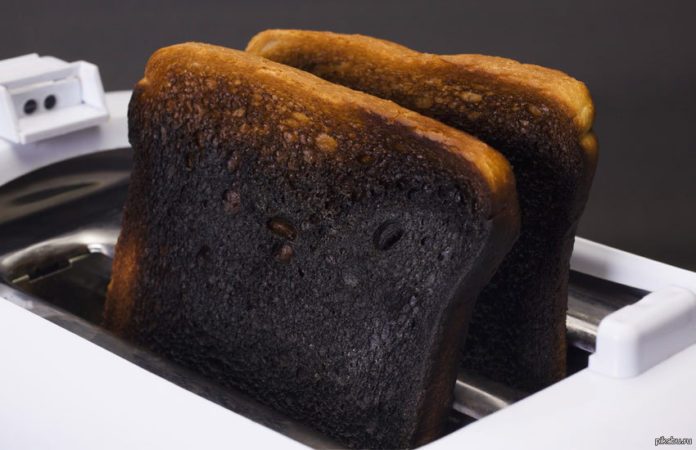
Eating breakfasts with overcooked chips, burnt toast and well-browned roast potatoes that is more than lightly grilled, could raise the risk of cancer, according to a public health campaign urging people to change their cooking and eating habits. On Monday, The UK Food Standards Agency (FSA) launched a public warning campaign called “Go for Gold” to embolden people to aim for a golden yellow colour when frying, roasting, baking, grilling or toasting starchy foods to minimise exposure to a chemical called “acrylamide”.
The Food Standards Agency’s (FSA) experts said people are consuming too much acrylamide [an odourless white crystal compound that naturally produced as a result of cooking starchy foods at high temperatures (above 120°C)]. The chemical compound “Acrylamide” is discovered in high levels a range of foods including potato products (children’s potato shapes or waffles), crackers, crispbread, cooked pizza bases, root vegetables (sweet potatoes, potatoes, turnip, beetroot, swede) as well as breakfast cereal-based (not porridge) foods.
They can all carry high levels of the compound once they have been fried, baked or roasted until crispy or darker brown. As well as long cooking times, high temperatures can increase levels of acrylamide even further. Foods such as crisps and skinny fries appear to have the highest levels. Acrylamide naturally forms in starchy food during cooking at temperatures hotter than 120°C and it has been labelled carcinogenic (a substance capable of causing cancer in living tissue). The thing is that “acrylamide” forms due to a chemical reaction between amino acid (asparagine) and certain sugars in the food.

The campaign is based on longstanding evidence (carcinogenic nature of acrylamide in food) from animal studies in 2002, but the link is yet to be proved in human studies. Some medical professionals are highlighting that other lifestyle factors pose much greater cancer risks, such as obesity and smoking.
The US Environmental Protection Agency has said acrylamide is “likely to be carcinogenic to humans” based on studies in lab animals. And the International Agency for Research on Cancer (IARC), part of the World Health Organisation, classifies acrylamide as a “probable human carcinogen” based on evidence from a 1994 study. The FSA’s official line is that “acrylamide in food has the potential to cause cancer in humans.” There’s just one problem: there’s no compelling evidence that acrylamide causes cancer in humans.
UK Cancer Research notes that there’s some evidence from animal studies that acrylamide and its metabolite glycidamide are genotoxic and carcinogenic, it might interact with DNA, and therefore it could generate changes linked to cancer. But human studies have yet to find such a connection. The American Cancer Society says that there’s no evidence that acrylamide intake increases the risk of getting any type of cancer.
But the Chief Cancer Control Officer (The American Cancer Society), Richard Wender noted that crispy carbs and fried potatoes do have one link to cancer: “They are full of needless calories and obesity is the second leading cause of preventable cancer in the US, just behind tobacco.”

“As a general rule of thumb, aim for a golden yellow colour or lighter when frying, baking, toasting or roasting starchy foods like potatoes, root vegetables and bread,” the FSA’s “Go for Gold” campaign recommends.
Such type of story can also create a backlash because it causes unnecessary worry for people. People hear a story like this and think it’s ridiculous. According to Paul Pharoah, professor of cancer epidemiology at the University of Cambridge, “health-scare stories make people lose faith or belief in what experts have to say.” “It over-suggests what the risk might be and because of that it actually takes away from other more important public health messages about risks that really matter,” continued Professor Pharoah. “Like smoking.”
The new campaign asks people to keep their food golden brown or yellow colour and not let it cook to darker colours. This campaign’s aim is to increase awareness among the public.

“Our research indicates that the majority of people are not aware that acrylamide exists, or that they might be able to reduce their personal intake,” Steve Wearne, director of policy at the Food Standards Agency, said in a statement. The government body analyses and shows current research in nutrition, food safety and food-related disease of importance to public health.
Manufacturers had already taken steps to cut the levels of acrylamide in foods, but it was time for consumers to be made more aware of the risks, said Steve Wearne, director of policy at the FSA. He said studies showed adults, children and even babies in the UK consumed too much acrylamide from food. However, there are no studies on the effect on children. But there’s evidence that babies in the womb can be harmed by their mothers’ eating habits, including acrylamide-rich food. Acrylamide, unlike many other toxins, can pass through the placenta and was found in the foetal blood, too.

Steve Wearne added: “We are not saying people should worry about the occasional meal… this is about managing risk
over a lifetime. “Anything you can do to reduce your exposure will reduce your lifetime risk.”
What should I do to reduce my cancer risk?
1. To reduce your risk, eat a healthy, balanced diet- instead of gorging on starchy carbs.
2. Follow the cooking instructions on food packages to avoid overcooking.
3. Aim for a golden brown or yellow color when frying, baking or roasting food.
4. Toasties should be fluffed up before cooking to minimise browning.
5. Pre-soaking chips before cooking can also reduce levels.
6. Raw potatoes should not be kept in the fridge, because this can increase acrylamide levels, store them in a cool, dark place where the temperature is above 6C.
7. Boiling, steaming and microwaving food has been found to produce less acrylamide than frying, baking or roasting.
8. Not to keep your cooking spud for a long time.























